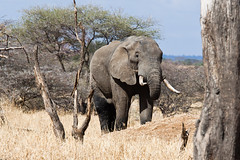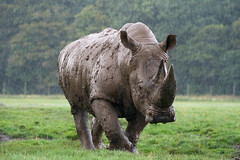 各國政府19日在日內瓦召開一場聯合國專案會議,為非洲象生存募集新的信託基金。全球保育專家計畫未來三年內要募集一億美金來保護非洲象的生存,因為牠們正面臨象牙非法交易和盜獵日益猖獗的威脅。
各國政府19日在日內瓦召開一場聯合國專案會議,為非洲象生存募集新的信託基金。全球保育專家計畫未來三年內要募集一億美金來保護非洲象的生存,因為牠們正面臨象牙非法交易和盜獵日益猖獗的威脅。
這次會議是華盛頓公約(CITES)的常務委員會例會,會中發起的募資行動,是為了執行「非洲象保育行動計畫」,而相關的諮詢與前置手續都已在今年初完成。
目前已有荷蘭、德國和法國挹注經費,還有更多潛在的捐款者都知悉這項新信託基金剛成立,需要資金的需求。由聯合國環境規劃署掌管的CITES秘書處秘書長John Scanlon表示,「我們期望捐款者可以聽到非洲的迫切需求,並支持非洲象保育行動計畫。」他表示,「為了在加強執法並確保非洲象數量可長期維持,信託基金的目標是在未來三年要募集一億美元的資金。」
這次為期一週CITES會議不只討論非洲象問題,議程還包括:減少獵殺犀牛、老虎和其他大型貓科動物,桃花心木等木材非法貿易,鱘魚捕撈和魚子醬買賣,以及皮革業者使用的爬蟲類皮品來源追蹤。另外,議程也討論到最近有關非州象、亞州象的盜獵和非法交易研究。
會中另有一項插曲,亞洲國家代表17日早上在討論大象議題時提案,要求驅離保育團體,但當天下午,大會即收回成命。
世界自然基金會(WWF)野生動物交易政策分析家Colman O Criodain博士表示,「我們對於整個會議的結果感到非常滿意…有些國家試圖規避(第三方)檢視自身在非法交易上的角色,最後卻只是吸引更多人注意。」
針對國際間日漸攀升的象牙走私活動,以及泰國境內以中部非洲為主要貨源的象牙貿易市場失序情況,CITES常務委員會已要求泰國提出書面報告,敘明加強管理的策略。針對這點,WWF表示欣慰。Croidain表示,泰國政府將主辦2013年CITES締約國大會,如果他們到時無法提出令人滿意的報告,可能會面臨國際制裁。」
犀牛角走私依舊猖獗
 CITES常務委員會也討論到,盜獵犀牛和犀牛角走私問題極為嚴重,需要創新的方式來解決問題,甚至有某位代表用「幾乎失控」來描述問題的嚴重性。
CITES常務委員會也討論到,盜獵犀牛和犀牛角走私問題極為嚴重,需要創新的方式來解決問題,甚至有某位代表用「幾乎失控」來描述問題的嚴重性。
世界各地所有的犀牛族群都受到盜獵威脅,特別是在剛果民主共和國、印度、莫三比克、尼泊爾、南非和辛巴威等國家,看起來都是為了犀牛角走私。
CITES將會組成一專家小組,負責檢視由犀牛分布國家和犀牛角輸入國提出的保育行動計畫進展。
根據南非政府提出的報告,該國在2011的前半年,總共有174頭犀牛遭非法獵殺。最近幾年在南非的偷獵數字越來越高,2007年有13頭,2008年有83頭,2009年有122頭,而2010年有330頭。
自2011年1月起,當局共緝捕122位盜獵犀牛的嫌疑人,其中有60位是在克魯格(Kruger)國家公園犯案,使該公園的保護區蒙受有史以來最大的損失。
CITES常務委員會討論的議題還包括:祕魯政府建立了可靠的林木認證系統、以及從公海引進海洋生物的新規定等等。
CITES目前有175個國家加入,這項國際公約在1975年生效,目標要確保全球野生動植物的生存,不會受人類的貿易行為所危害。
Global conservation experts aim to raise US$100 million over the next three years to ensure the long-term survival of African elephants in the face of increased poaching and a thriving illegal trade in ivory.
Government delegates to a United Nations-backed meeting in Geneva agreed Friday to contribute to a new trust fund for elephant survival.
A multi-donor technical trust for the implementation of an African Elephant Action Plan was launched at the meeting of the Standing Committee of the Convention on International Trade in Endangered Species, CITES after full consultation and all formalities were concluded early in the year.
The Netherlands, Germany and France have already contributed to the new fund and other potential donors were encouraged to join them.
"We expect that donors will hear the urgent needs of Africa and support the implementation of the African Elephant Action Plan," said John Scanlon, Secretary-General of CITES, whose secretariat is administered by the UN Environment Programme.
"The target is to raise $100 million over the next three years to enhance law enforcement capacity and secure the long-term survival of African elephant populations," he said.
Elephant conservation and new financial mechanisms were among several issues on the agenda of the week-long meeting, in addition to measures to reduce current levels of poaching of rhinos, tigers and other big cats, illegal trade in mahogany and other timber species, the fate of sturgeon and the caviar trade, and the sourcing of reptile skins used in the leather industry.
The committee considered recent findings concerning African and Asian elephants, poaching levels and illegal trade in ivory.
A decision to exclude conservation groups from the debate on elephant issues, proposed by the Asian region last Wednesday morning, was overturned that afternoon after a second vote.
"We are very happy with the outcomes of the meeting overall," said Dr. Colman O Criodain, wildlife trade policy analyst with the global conservation organization WWF.
"Attempts by some countries to evade scrutiny of their role in illegal trade only ensured that these countries are now more under the spotlight than before."
WWF was pleased that the Committee responded to increasing illegal ivory trade by requiring Thailand to report in writing on curbing its uncontrolled domestic ivory trade, which is largely sourced from Central African elephants.
Thailand, which is to host the next CITES Conference of the Parties in 2013, will risk facing sanctions if it fails to report satisfactorily by then, Criodain said.
The Committee also recognized rhinoceros poaching and illegal trade in their horns as a major challenge that requires innovative approaches, with one delegation describing the situation "as almost out of control."
All populations of rhinoceroses are suffering from poaching, particularly those in the Democratic Republic of the Congo, India, Mozambique, Nepal, South Africa and Zimbabwe. The illegal trade in rhinoceros horns appears to be the main motive.
An expert group will scrutinize the progress made by rhino range states and importing countries on this issue.
According to a report submitted by the South African government, a total of 174 rhino have been illegally killed in that country during the first six months of 2011.
Poaching levels in South Africa have risen in recent years: 13 rhinos poached in 2007, 83 in 2008, 122 in 2009 and 330 in 2010.
A total of 122 suspected rhino poachers have been arrested in South Africa since January 2011, 60 of them in the Kruger National Park, which is the protected area that has suffered the biggest losses.
The CITES Standing Committee also reviewed efforts by Peru to establish reliable timber verification systems, and new rules for introducing marine species from international waters, among other topics.
Some 175 countries have joined CITES, an international agreement that entered into force in July 1975 and aims to ensure that global trade in specimens of wild animals and plants does not threaten their survival.
※ 全文及圖片詳見:ENS報導





